8初中八大时态,被动语态
初中英语八种时态及被动语态的讲解与练习
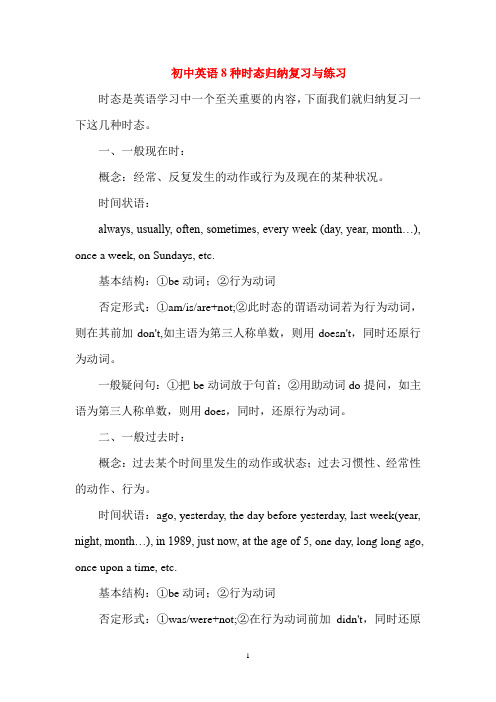
初中英语8种时态归纳复习与练习时态是英语学习中一个至关重要的内容,下面我们就归纳复习一下这几种时态。
一、一般现在时:概念:经常、反复发生的动作或行为及现在的某种状况。
时间状语:always, usually, often, sometimes, every week (day, year, month…), once a week, on Sundays, etc.基本结构:①be动词;②行为动词否定形式:①am/is/are+not;②此时态的谓语动词若为行为动词,则在其前加don't,如主语为第三人称单数,则用doesn't,同时还原行为动词。
一般疑问句:①把be动词放于句首;②用助动词do提问,如主语为第三人称单数,则用does,同时,还原行为动词。
二、一般过去时:概念:过去某个时间里发生的动作或状态;过去习惯性、经常性的动作、行为。
时间状语:ago, yesterday, the day before yesterday, last week(year, night, month…), in 1989, just now, at the age of 5, one day, long long ago, once upon a time, etc.基本结构:①be动词;②行为动词否定形式:①was/were+not;②在行为动词前加didn't,同时还原行为动词。
一般疑问句:①was或were放于句首;②用助动词do的过去式did 提问,同时还原行为动词。
三、现在进行时:概念:表示现阶段或说话时正在进行的动作及行为。
时间状语:now, at this time, these days, etc.基本结构:am/is/are+doing否定形式:am/is/are+not+doing.一般疑问句:把be动词放于句首。
四、过去进行时:概念:表示过去某段时间或某一时刻正在发生或进行的行为或动作。
初中英语8种时态及情态动词的被动语态 总结表格版
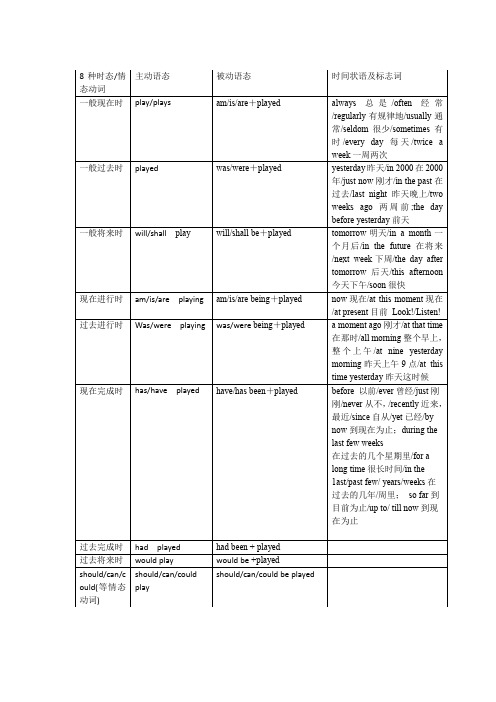
tomorrow明天/in a month一个月后/in the future在将来/next week下周/the day after tomorrow后天/this afternoon今天下午/soon很快
现在进行时
am/is/are playing
am/is/are being+played
一般现在时plຫໍສະໝຸດ y/playsam/is/are+played
always总是/often经常/regularly有规律地/usually通常/seldom很少/sometimes有时/every day每天/twice a week一周两次
一般过去时
played
was/were+played
yesterday昨天/in 2000在2000年/just now刚才/in the past在过去/last night昨天晚上/two weeks ago两周前;the day before yesterday前天
should/can/could(等情态动词)
should/can/could play
should/can/could be played
时态解题步骤
看时间标志词确定时态看主语与动词关系确定语态看人称确定单复数
现在完成时
has/have played
have/has been+played
before以前/ever曾经/just刚刚/never从不,/recently近来,最近/since自从/yet已经/by now到现在为止;during the last few weeks
在过去的几个星期里/for a long time很长时间/in the 1ast/past few/years/weeks在过去的几年/周里;so far到目前为止/up to/ till now到现在为止
英语八种时态主动形式和被动形式

一、一般现在时态(Simple Present Tense)1. 主动形式:表示经常性、习惯性的动作或状态。
例句:He drinks coffee every morning.(他每天早上喝咖啡。
)2. 被动形式:表示动作的承受者或主语受到动作的影响,常与by短语连用。
例句:Coffee is drunk by him every morning.(咖啡每天早上被他喝。
)二、一般过去时态(Simple Past Tense)1. 主动形式:表示过去某个时间发生的动作或状态。
例句:She studied English last night.(昨晚她学习了英语。
)2. 被动形式:表示过去某个时间主语受到动作的影响。
例句:English was studied by her last night.(昨晚英语被她学习了。
)三、一般将来时态(Simple Future Tense)1. 主动形式:表示将来某个时间将要发生的动作或状态。
例句:They will visit their grandparentstomorrow.(他们明天将会去看望他们的祖父母。
)2. 被动形式:表示将来某个时间主语将会受到动作的影响。
例句:The grandparents will be visited by themtomorrow.(明天祖父母将会被他们去看望。
)四、现在进行时态(Present Continuous Tense)1. 主动形式:表示现在正在进行的动作或状态。
例句:They are playing soccer in the park.(他们正在公园里踢足球。
)2. 被动形式:表示主语正在被动作影响的动作或状态。
例句:Soccer is being played by them in thepark.(他们正在公园里踢足球。
)五、过去进行时态(Past Continuous Tense)1. 主动形式:表示过去某个时间正在进行的动作或状态。
八大时态的被动语态的公式

八大时态的被动语态的公式(每个公式中的done表示过去分词)1.一般现在时.is/am/are+donee.g:you're wanted on the phone.2.现在进行时.is/am/are+being+donee.g:The homework is being written (by Tom)now.3.一般将来时.will/shall be+donee.g:The car will be repaired (by him)tomorrow.4.现在完成时.have/has been+donee.g:Many bridges have been repaired.5.一般过去时。
was/were+donee.g:He is seen to go out of school.6.过去进行时。
was/were+doing+donee.g:The room was being cleaned this time yesterday.7.过去将来时。
would be+donee.g:He told us that the new railway would be built the next year.8.过去完成时。
had been+doneOur classroom had been cleaned last Tuseday.类型1:表示状态和状态的持续,如:be(是), seem(似乎), look(看起来), appear(似乎), feel(觉得), sound(听起来), smell(闻起来), taste(尝起来), keep(保持), remain(保持), stand(站立), lie(躺), stay(停留)等。
类型2:表示从一种状态转变为另一种状态,如:become(变成), go(变得), get(变得), turn(变成), grow(长成), fall(变成某种状态), come(成为), run(变成)等。
英语八大基本时态及其对应被动语态

时态
主动语态
被动语态
现在完成时 过去完成时 一般将来时
has/have + has/have + 过去分词 been+过去分词
had + 过去分词 1. will/shall+ do
had + been+过去分词
1. will/shall+ be+过去分词
2. am/is/are+ 2. am/is/are+ going to be+过去分词 going to do 1. would/should+ do 1. would/should+
பைடு நூலகம்时态
主动语态
被动语态
一般现在时
一般过去时
1. am/is/are 2. 动词原形 1. was/were 2. 动词过去式
am/is/are + 过去分词 was/were + 过去分词
现在进行时 过去进行时
am/is/are + am/is/are + doing being+过去分词 was/were + was/were + doing being+过去分词
be+过去分词
过去将来时 2. was/were+ going to do
2. was/were+ going to be+过去分词
句型转换
• • • • • • • • • • All his students love him. He is loved by all his students. My aunt brought me up. I was brought up by my aunt. We will hold an examination next week. An examination will be held next week. We are going to discuss this problem tomorrow. This problem is going to be discussed tomorrow. We have finished this task. This task have been finished.
八大时态的被动语态结构

八大时态的被动语态结构
以下是八大时态的被动语态结构:
1. 现在时被动语态(Present Simple Passive):主语 + am/is/are + 过去分词。
2. 过去时被动语态(Past Simple Passive):主语 + was/were + 过去分词。
3. 将来时被动语态(Future Simple Passive):主语+ will be + 过去分词。
4. 现在进行时被动语态(Present Continuous Passive):主语 + am/is/are being + 过去分词。
5. 过去进行时被动语态(Past Continuous Passive):
主语 + was/were being + 过去分词。
6. 现在完成时被动语态(Present Perfect Passive):
主语 + has/have been + 过去分词。
7. 过去完成时被动语态(Past Perfect Passive):主语 + had been + 过去分词。
8. 将来完成时被动语态(Future Perfect Passive):主语 + will have been + 过去分词。
8初中八大时态,被动语态
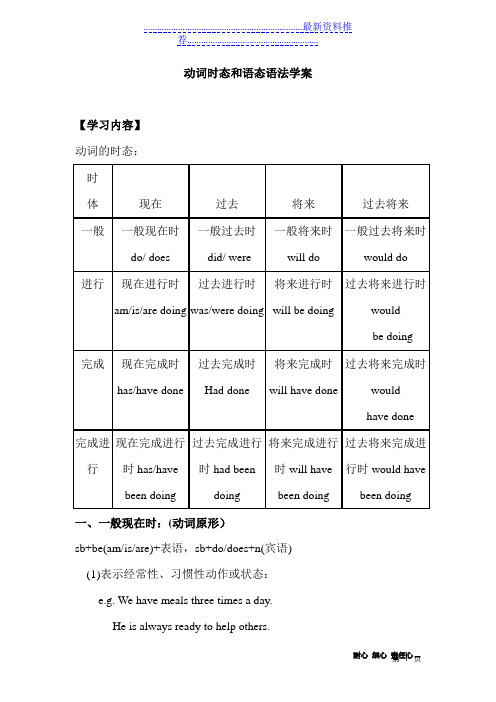
自从我们来这儿已经20年了.
It is 20 years since we lived here.
自从我们不在这儿住已经20年了.
常见的瞬间动词有: come, go, get to/reach/arrive at, leave, buy, sell, open, close, get up, join/take part in, begin/start, return/give, borrow/lend, become/turn, bring/take, jump, die, finish/end, receive/hear from, marry, break, lose。
e.g. He will be back in a few days.
注意将来时几种形式的区别:
will(shall) do, be going to do, be about to do, be doing, be to do, do/does
(1)will(shall) do 表示将来要出现的动作或状态; 表示事物的必然趋势; 表示主语的 “意愿”.will还有临时决定去做.
e.g. My birthday falls on May 2.
The ship leaves at 9:00 a.m
(5) 图片说明、电影说明、解说戏剧内容及场景等。
(6)由here, there, now, then开头的句子
e.g. There goes the bell.
Now comes your turn.
e.g. I was having breakfast at 7 in the morning.
初中英语八种时态详解及练习
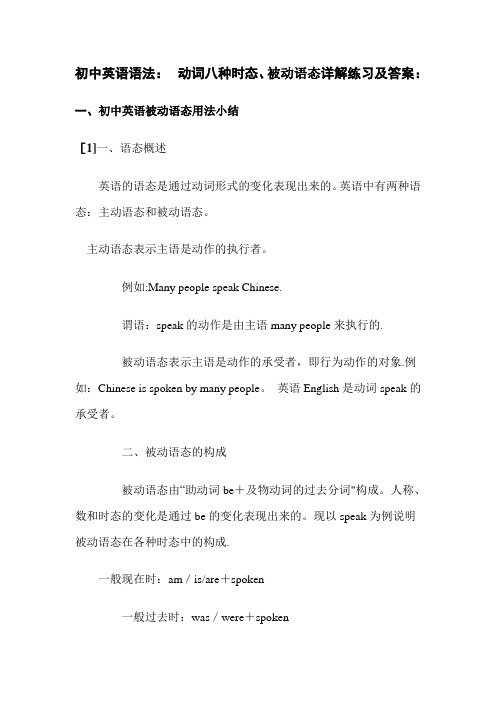
初中英语语法:动词八种时态、被动语态详解练习及答案:一、初中英语被动语态用法小结[1]一、语态概述英语的语态是通过动词形式的变化表现出来的。
英语中有两种语态:主动语态和被动语态。
主动语态表示主语是动作的执行者。
例如:Many people speak Chinese.谓语:speak的动作是由主语many people来执行的.被动语态表示主语是动作的承受者,即行为动作的对象.例如:Chinese is spoken by many people。
英语English是动词speak的承受者。
二、被动语态的构成被动语态由“助动词be+及物动词的过去分词"构成。
人称、数和时态的变化是通过be的变化表现出来的。
现以speak为例说明被动语态在各种时态中的构成.一般现在时:am/is/are+spoken一般过去时:was/were+spoken一般将来时:will/shall be+spoken现在进行时:am/is/are being+spoken过去进行时:was/were being+spoken现在完成时:have/has been+spoken过去完成时:had been + spoken三、被动语态的用法(1)不知道或没有必要说明动作的执行者是谁。
例如:Some new computers were stolen last night.一些新电脑在昨晚被盗了.(不知道电脑是谁偷的)This bridge was founded in 1981。
这座桥竣工于1981年。
(2)强调动作的承受者,而不强调动作的执行者。
例如:The glass was broken by Mike.玻璃杯是迈克打破的。
This book was written by him.这本书是他写的.Your homework must be finished on time.你们的家庭作业必须及时完成。
四、主动语态变被动语态的方法(1)把主动语态的宾语变为被动语态的主语。
八种时态的结构和被动语态

八种时态的结构和被动语态一、一般现在时态一般现在时态表示经常性的动作或状态。
在句子中,主语加上动词的原形即可构成一般现在时态的句子。
例句:Dogs bark.(狗叫。
)被动语态:由“be+过去分词”构成。
例句:The cake is baked by my mother.(蛋糕是我妈妈烤的。
)二、一般过去时态一般过去时态表示过去某个时间发生的动作或存在的状态。
在句子中,主语加上动词的过去式即可构成一般过去时态的句子。
例句:She ate an apple yesterday.(她昨天吃了一个苹果。
)被动语态:由“was/were+过去分词”构成。
例句:The book was written by Mark Twain.(这本书是马克·吐温写的。
)三、一般将来时态一般将来时态表示将要发生的动作或存在的状态。
在句子中,主语加上助动词“will”或“shall”,再加上动词的原形即可构成一般将来时态的句子。
例句:I will visit my grandparents next week.(我下周会去看望我的祖父母。
)被动语态:由“wil l be+过去分词”或“is/am/are going to be+过去分词”构成。
例句:The letter will be delivered by the postman.(这封信将由邮递员投递。
)四、现在进行时态现在进行时态表示现在正在进行的动作。
在句子中,主语加上“be”动词的现在分词形式,再加上动词的原形即可构成现在进行时态的句子。
例句:She is watching TV now.(她正在看电视。
)被动语态:由“am/is/are being+过去分词”构成。
例句:The house is being cleaned by the maid.(房子正在被女仆打扫。
)五、过去进行时态过去进行时态表示过去某个时间正在进行的动作。
在句子中,主语加上“was/were”动词的现在分词形式,再加上动词的原形即可构成过去进行时态的句子。
各种时态的被动语态

各种时态的被动语态一、八大时态的被动语态的构成:1.一般现在时的被动语态构成:(am/is/are +done)如:I am asked to study hard. 我被请求努力学习。
This shirt is washed once a week. 这件T恤一周洗一次。
These songs are usually sung by boys. 这些歌曲通常是男生唱的。
2.一般过去时的被动语态构成:(was/were done)如:The soldier was killed, but the train was saved. 这位战士牺牲了,然而列车得救了。
Some notes were passed up to the speaker. 有人给讲演者递上来一些纸条。
3.一般将来时的被动语态构成:(shall/will be done)如:We shall be asked a lot of strange questions. 我们将被问许多怪题。
My son will be sent to school next September. 来年九月我将送我儿子去读书。
4.过去将来时的被动语态构成:(should/would be done)如:The news would be sent to him as soon as it arrived. 消息一到就会转给他的。
He told us that the new railway would be built the next year. 他告诉我新铁路将在明年修建。
5.现在完成时的被动语态构成:(has/have been done)如:The work has just been finished. 工作刚刚结束。
The old rules have been done away with by us. 旧规章已经被我们废除了。
6.过去完成时的被动语态构成:(had been done)如:By last December three ships had been built by them. 到去年十二月底他们已建造了三艘船。
初中英语八大时态表
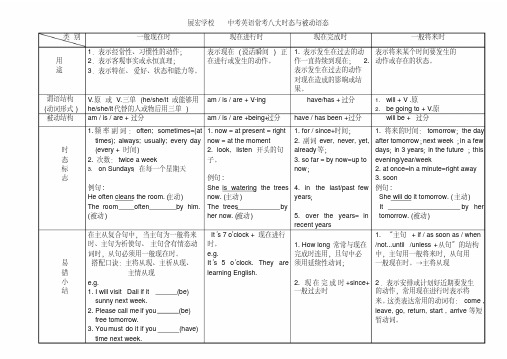
展宏学校中考英语常考八大时态与被动语态类别一般现在时现在进行时现在完成时一般将来时用途1.表示经常性、习惯性的动作;2.表示客观事实或永恒真理;3.表示特征、爱好、状态和能力等。
表示现在(说话瞬间) 正在进行或发生的动作。
1. 表示发生在过去的动作一直持续到现在; 2.表示发生在过去的动作对现在造成的影响或结果。
表示将来某个时间要发生的动作或存在的状态。
谓语结构(动词形式) V.原或V.三单(he/she/it或能够用he/she/it代替的人或物后用三单)am / is / are + V.-ing have/has + 过分 1.will + V.原2.be going to + V.原被动结构am / is / are + 过分am / is / are +being+过分have / has been + 过分will be + 过分时态标志1.频率副词:often; sometimes=(attimes); always; usually; every day(every + 时间)2. 次数:twice a week3.on Sundays:在每一个星期天例句:He often cleans the room. (主动)The room often by him.(被动)1. now = at present = rightnow = at the moment2. look, listen 开头的句子。
例句:She is watering the treesnow. (主动)The trees byher now. (被动)1. for / since+时间;2. 副词ever, never, yet,already等;3. so far = by now=up tonow;4. in the last/past fewyears;5. over the years= inrecent years1. 将来的时间:tomorrow;the dayafter tomorrow;next week ;in a fewdays;in 3 years;in the future ;thisevening/year/week2. at once=in a minute=right away3. soon例句:She will do it tomorrow. (主动)It by hertomorrow. (被动)易错小结在主从复合句中,当主句为一般将来时、主句为祈使句、主句含有情态动词时,从句必须用一般现在时。
各种时态的被动语态

各种时态的被动语态各种时态的被动语态一、八大时态的被动语态的构成:1.一般现在时的被动语态构成:(am/is/are +done)如:I am asked to study hard. 我被请求努力学习。
This shirt is washed once a week. 这件T恤一周洗一次。
These songs are usually sung by boys. 这些歌曲通常是男生唱的。
2.一般过去时的被动语态构成:(was/were done)如:The soldier was killed, but the train was saved. 这位战士牺牲了,然而列车得救了。
Some notes were passed up to the speaker. 有人给讲演者递上来一些纸条。
3.一般将来时的被动语态构成:(shall/will be done)如:We shall be asked a lot of strange questions. 我们将被问许多怪题。
My son will be sent to school next September. 来年九月我将送我儿子去读书。
4.过去将来时的被动语态构成:(should/would be done)如:The news would be sent to him as soon as it arrived. 消息一到就会转给他的。
He told us that the new railway would be built the next year. 他告诉我新铁路将在明年修建。
5.现在完成时的被动语态构成:(has/have been done)如:The work has just been finished. 工作刚刚结束。
The old rules have been done away with by us. 旧规章已经被我们废除了。
8种时态的被动语态

动词的语态:主动语态和被动语态被动语态的基本结构:Be + done(过去分词)1、一般现在时:(主动语态)I help you.发出者动词承受者变为被动语态:Do——am/is/are doneYou are helped by me.承受者谓语发出者2、一般过去时的被动:did——was/were done(I helped you.-每个例子可让学生自己先尝试变被动,再给答案)3、一般将来时的被动:Will do——will be done(I will help you.-)4、现在进行时的被动:Am/is/are doing ——Am/is/are being done(I am helping you.-)5、过去进行时的被动:Was/were doing——Was/were being done(I was helping you.-)6、现在完成时的被动:Have done——have been done (I have helped you.-)7、过去完成时的被动:Had done——had been done (I had helped you.-)8、过去将来时的被动:Would do ——would be done (I would help you.-)答案:2、You were helped by me.3、You will be helped by me.4、You are being helped by me.5、You were being helped by me.6、You have been helped by me.7、You had been helped by me.8、You would be helped by me.。
八个时态(含被动语态)
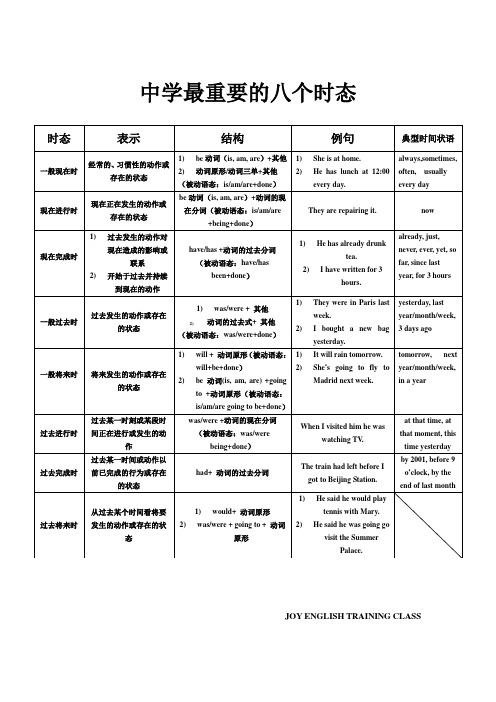
中学最重要的八个时态JOY ENGLISH TRAINING CLASS时态表示结构例句典型时间状语一般现在时经常的、习惯性的动作或存在的状态1) be 动词(is, am, are )+其他 2)动词原形/动词三单+其他(被动语态:is/am/are+done ) 1) She is at home. 2)He has lunch at 12:00 every day.always,sometimes, often, usuallyevery day现在进行时现在正在发生的动作或存在的状态 be 动词(is, am, are )+动词的现在分词(被动语态:is/am/are+being+done ) They are repairing it.now现在完成时1)过去发生的动作对现在造成的影响或联系2)开始于过去并持续到现在的动作have/has +动词的过去分词 (被动语态:have/hasbeen+done )1) He has already drunktea.2)I have written for 3hours.already, just, never, ever, yet, so far, since last year, for 3 hours一般过去时过去发生的动作或存在的状态1)was/were + 其他 2)动词的过去式+ 其他(被动语态:was/were+done ) 1) They were in Paris last week. 2)I bought a new bag yesterday.yesterday, last year/month/week, 3 days ago一般将来时将来发生的动作或存在的状态1)will + 动词原形(被动语态:will+be+done )2)be 动词(is, am, are) +going to +动词原形(被动语态:is/am/are going to be+done ) 1) It will rain tomorrow. 2)She ’s going to fly to Madrid next week.tomorrow, nextyear/month/week,in a year过去进行时过去某一时刻或某段时间正在进行或发生的动作was/were +动词的现在分词 (被动语态:was/werebeing+done ) When I visited him he waswatching TV . at that time, at that moment, this time yesterday 过去完成时过去某一时间或动作以前已完成的行为或存在的状态had+ 动词的过去分词The train had left before I got to Beijing Station. by 2001, before 9 o ’clock, by the end of last month过去将来时从过去某个时间看将要发生的动作或存在的状态1) would+ 动词原形2)was/were + going to + 动词原形1)He said he would play tennis with Mary.2)He said he was going go visit the SummerPalace.。
8种常用时态的被动语态

8种常用时态的被动语态由“助动词be + 动词的过去分词”构成。
助动词be 有时态、人称和数的变化。
(1) 一般现在时:am/is/are +过去分词。
如:Rice is grown in south China. 华南种植水稻。
(2) 一般过去时:was/were+过去分词。
如:The glass was broken yesterday. 这块玻璃是昨天打烂的。
(3) 现在进行时:am/is/are being +过去分词。
如:The project is being carried out. 这个计划正在执行中。
(4) 过去进行时:was/were/being +过去分词。
如:This road was being built this time last year. 这条路去年这个时候还在修建。
(5) 一般将来时:will be +过去分词。
如:The cars will be sent abroad by sea. 这些汽车将由水路运往国外。
(6) 过去将来时:would be +过去分词。
如:The manager said the project would be completed by the end of the year. 经理说这个工程在年底前将会完成。
(7) 现在完成时:have/has been +过去分词。
如:This novel has been translated into several languages. 这本小说已被译成了几种语言。
(8) 过去完在时:had been +过去分词。
如:When I got to the theatre, I found the tickets had already been sold out. 我到达剧院时,发现票已卖完了。
被动语态的主要用法■当不知道或没有必要指出动作的执行者时,常用被动语态,这时往往不用by短语。
- 1、下载文档前请自行甄别文档内容的完整性,平台不提供额外的编辑、内容补充、找答案等附加服务。
- 2、"仅部分预览"的文档,不可在线预览部分如存在完整性等问题,可反馈申请退款(可完整预览的文档不适用该条件!)。
- 3、如文档侵犯您的权益,请联系客服反馈,我们会尽快为您处理(人工客服工作时间:9:00-18:30)。
8初中八大时态,被动语态-CAL-FENGHAI-(2020YEAR-YICAI)_JINGBIAN动词时态和语态语法学案【学习内容】sb+be(am/is/are)+表语,sb+do/does+n(宾语)(1)表示经常性、习惯性动作或状态:e.g. We have meals three times a day.He is always ready to help others.(2)表示不受时间限制的事实或普遍真理。
e.g. The sun rises in the east and sets in the west.(3)用在状语从句中,构成“主将从现”的句子结构。
e.g. I will let you know as soon as I hear from him.(4)表示已安排或计划好将来必定发生的动作或存在的状态,一般用be, come,go, arrive, leave, start等动词。
e.g. My birthday falls on May 2.The ship leaves at 9:00 a.m(5) 图片说明、电影说明、解说戏剧内容及场景等。
(6)由here, there, now, then开头的句子e.g. There goes the bell.Now comes your turn.二、一般过去时:(动词过去式)sb+be(was/were)+表语,sb+did(动词过去时)+n(宾语)表示在过去时间里发生的动作或存在的状态,常与表示过去的时间状语连用yesterday,last night,in 1990,two days ago,the day before yesterday,last summer,at that timee.g. He didn’t watch TV last night.三、一般将来时:(will(shall) do)表示将来发生的动作或存在的状态,常与表示将来的时间状语连用tomorrow,next year,next week,in the future,the day after tomorrow。
e.g. He will be back in a few days.注意将来时几种形式的区别:will(shall) do, be going to do, be about to do, be doing, be to do, do/does(1)will(shall) do 表示将来要出现的动作或状态; 表示事物的必然趋势; 表示主语的“意愿”.will还有临时决定去做.e.g. Tom will come back next week.Man will die without air.--Who will go and help that poor old man?--Mary will . (玛莉愿意。
)(2) be going to do表示即将会…, 打算将…(人打算去做);表示根据现在的现象对未来进行推断.e.g. He is going to speak on TV this evening.他计划今晚到电视台讲话.Look at the dark clouds. It is going to rain.(3) be about to do 即将…(马上要发生的动作.), 此句型不与时间状语连用.e.g. The train is about to leave. 火车就要开了.(4) be doing表示定于…(指接近的将来动作)e.g. He is leaving for Hong Kong tomorrow morning.他定于明天早晨到香港去.(5) be to do①表示按计划或安排要做的事情(定于…, 指预定的将来动作)e.g. President Bush is to visit China next month.She is to get married next month.② 表示“应该”(指令性的动作),相当于should/must/have toe.g. This medicine is to be taken three times a day.You are to report to the police.③ 表示“想, 打算”, 相当于intend, want.(能用在从句当中)e.g. If we are to be there before ten, we’ll have to go now.④ be to be done的被动语态e.g. The news is to be found in the evening paper.(6) do/does 表示按计划、安排将来要发生的动作或状态.一般表示规定好的动作或状态.e.g. The train leaves at 8 o’clock.The class begins at 9 o’clock.四、过去将来时:(would do ; was/were going to do)过去将来时表示从过去某一时间来看将要发生的动作或存在的状态,常用在宾语从句中。
e.g. No one knew he was going to come.He said that he would go to the cinema.五、现在进行时:(am/is/are+doing)1.表示此时此刻正在进行的动作或目前这段时间内正在进行的动作.e.g. I was having breakfast at 7 in the morning.They are learning Chinese in Beijing.2. be always doing表示反复出现或习惯性动作,带有赞赏,厌恶等情绪.e.g. He is always thinking of othersHe is always making the same mistakes.3.用进行时可以表示过程e.g. It’s getting cold.The leaves on the trees are turning brown.六、过去进行时:(was/were+doing)表示过去某一时刻或某一阶段正在进行的动作。
这一特定的过去时间可用时间状语表示也可由上下文暗示。
常用时间状语:then,at that time,this time yesterday,at ten yesterdaye.g. As I was walking in the park, it began to rainThey were listening to the teacher attentively when the bell rang.七、将来进行时:(will be doing)表示将来某一时刻或某一阶段正在进行的动作。
e.g. I will be busy this evening. I will be writing an article.八、现在完成时:(have/has+done)现在完成时是以过去的时间为起点,表示过去的动作对现在造成的影响或结果,或表示一个动作从过去延续到现在。
现在完成时的时间状语:so far, since, for, in the past few years, up to now,till(until)now, recently, for a longtime, already, yet, just, before, recently,lately(注:already常用于肯定句,yet 常用于否定句和疑问句中,且常位于句末) e.g. He has been in the League for three years.They haven’t finished their homework yet.We have already worked out that problem.注意:since从句中的谓语动词是非延续性动词, 句子意思是肯定的含义, 即:自从干…至今….但是从句中的谓语动词若是延续性动词,句子的意思是否定的,即:自从不干..已经..e.g. It is 20 years since we came here.自从我们来这儿已经20年了.It is 20 years since we lived here.自从我们不在这儿住已经20年了.常见的瞬间动词有: come, go, get to/reach/arrive at, leave, buy, sell, open,close, get up, join/take part in, begin/start, return/give, borrow/lend,become/turn, bring/take, jump, die, finish/end, receive/hear from, marry, break, lose。
That/It is the first/second…time that 从句(从句要用现在完成时态)e.g. This is the first time (that) I have come here.注意:做题的时候,一定要先审清题, 然后在做, 出题时可能会利用你的思维定式,给你设下套儿.e.g. I ____ in London for many years, but I’ve never regretted my final decision tomove back to China.A. livedB. was livingC. have livedD. had lived注意:一般过去时与现在完成时的区别:His brother was in the army for five years.他的兄弟当过5年兵。
(现已退役) His brother has been in the army for five years. 他的兄弟已当兵5年。
(现仍在部队里)九、过去完成时:(had done)过去完成时表示过去的过去, 即一件事情发生在过去, 而另外一件事情先于它发生.e.g. She said (that) she had never been to Paris.When the police arrived, the thieves had run away.过去完成时一般和过去时一起出现 .sb had done sth before sb did/ sb did sth after sb had donee.g. I hadn't learned any English before I came here.我来这儿之前没学过英语。
